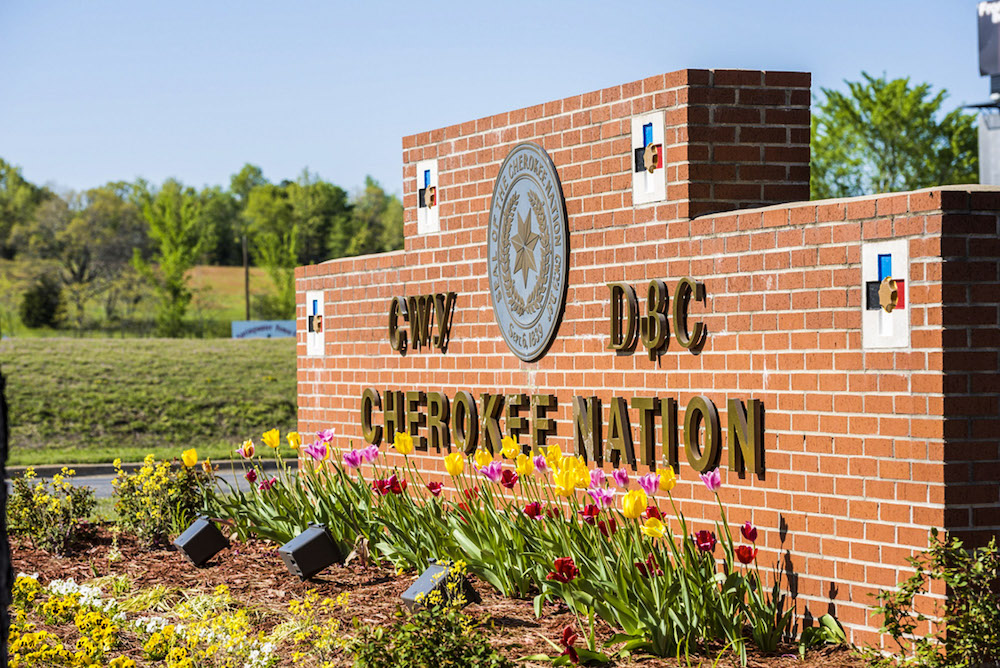
- Details
- By Darren Thompson
The enrollment of the Cherokee Nation of Oklahoma has surpassed 450,000 enrolled tribal citizens for the first time in its history, Native News Online has learned.
The record enrollment numbers follow a surge in new members following the COVID-19 pandemic and confirms Cherokee Nation as the country's largest federally recognized tribe in terms of enrollment.
“I really commend our Registration Department for meeting the needs of our citizens,” Cherokee Nation Principal Chief Chuck Hoskin Jr. said in a statement to Native News Online. “COVID-19 taught all of us that there is a great need out there in terms of broadband, food insecurities and vital services that our people need. We are the largest tribe in the United States and for our citizens to engage and connect with us is a sign that our Cherokee Nation government is strong and focused where it should be—serving our people.”
In order to meet higher demand in citizenship applications, its registration department added significant staff and expanded work shifts to 7 p.m. during the weekdays and worked on Saturdays, according to the Tribe.
“Our tribal citizens were longing to reconnect, access our services, especially during the pandemic and families are coming in to get their children registered for citizenship at an earlier age,” Cherokee Nation Tribal Registrar Derrick Vann in a statement to Native News Online. “During the height of the COVID-19 we were wading through as many as 3,000 to 5,000 applications per month and we’ve now processed those, and are back to working on current applications.”
Cherokee Nation citizens live throughout the United States and its territories, with approximately 140,000 living on the tribe’s reservation in northeast Oklahoma. The states with the largest tribal enrollment numbers are Oklahoma (279,227), Texas (27,894), California (27,049), Arkansas (19,044), and Kansas (15516). The Cherokee Nation of Oklahoma also has enrolled citizens in the American Samoa, the U.S. Virgin Islands, Guam and in the U.S. Military according to the Cherokee Nation’s tribal registration.
Enrollment in federally recognized tribes began after the reservation era, and criteria to become enrolled varies among tribes. The requirements for Cherokee Nation of Oklahoma tribal citizenship are that an applicant must submit official documentation that connects an applicant to a person who was enrolled on the Dawes Roll Final Rolls of Citizens and Freedman of the Five Civilized Tribes—Cherokee, Choctaw, Creek, Chickasaw, and Seminole Nations.
“You must trace directly back to at least one original enrollee on Dawes to be eligible for tribal citizenship,” says the Cherokee Nation of Oklahoma on its website.
The “Final Rolls of the Citizens and Freedmen of the Five Civilized Tribes in Indian Territory” determined the citizenry of each tribe, including the Cherokee Nation of Oklahoma and were accepted from 1898 through 1914 by the Dawes Commission, according to the National Archives.
The commission was named after the Commission’s chairman, Henry L. Dawes, and was appointed by President Grover Cleveland in 1893 to negotiate land with the Cherokee, Creek, Choctaw, Chickasaw and Seminole Nations.
The Cherokee Nation, also known as the Cherokee Nation of Oklahoma, is the largest of three Cherokee federally recognized tribes in the United States. The other two federally recognized Cherokee tribes are the United Keetoowah Band of Cherokee (UKB) in Oklahoma, and the Eastern Band of Cherokee (EBCI) in North Carolina. The Keetoowah and Eastern Bands require its citizens to be at least one-quarter (1/4) Cherokee to be enrolled as a citizen in their tribes. Blood quantum is not a factor in Cherokee Nation tribal citizenship eligibility.
The second largest tribe in the United States is the Navajo Nation, with official enrollment of 399,494 according to the Navajo Office of Vital Records and Identification in 2021. Native News Online could not confirm updated enrollment numbers of the Navajo Nation, which has the largest Indian reservation in the country in terms of area with more than 27,000 square miles.
More Stories Like This
Native News Weekly (August 25, 2024): D.C. BriefsScope Narrowed, Report Withheld: Questions Mount Over Michigan Boarding School Study
Zuni Youth Enrichment Project Announces Family Engagement Night and Spring Break Youth Programming
Next on Native Bidaské: Leonard Peltier Reflects on His First Year After Prison
Deb Haaland Rolls Out Affordability Agenda in Albuquerque
Help us defend tribal sovereignty.
At Native News Online, our mission is rooted in telling the stories that strengthen sovereignty and uplift Indigenous voices — not just at year’s end, but every single day.
Because of your generosity last year, we were able to keep our reporters on the ground in tribal communities, at national gatherings and in the halls of Congress — covering the issues that matter most to Indian Country: sovereignty, culture, education, health and economic opportunity.
That support sustained us through a tough year in 2025. Now, as we look to the year ahead, we need your help right now to ensure warrior journalism remains strong — reporting that defends tribal sovereignty, amplifies Native truth, and holds power accountable.
 The stakes couldn't be higher. Your support keeps Native voices heard, Native stories told and Native sovereignty defended.
The stakes couldn't be higher. Your support keeps Native voices heard, Native stories told and Native sovereignty defended.
Stand with Warrior Journalism today.
Levi Rickert (Potawatomi), Editor & Publisher

